The Effects of Space War Digital Game on Society: A Detailed Analysis
VerifiedAdded on 2022/09/16
|9
|2386
|17
Essay
AI Summary
This essay provides a comprehensive analysis of the Space War digital game, examining its ethical and social implications. It explores the game's potential impact on players, including increased aggression, violence, and addiction, while also acknowledging its positive aspects such as improved problem-solving skills and resource management. The analysis delves into the game's influence on social relationships, gender dynamics, and the promotion of both positive and negative behaviors. Furthermore, the essay discusses the role of gamification, the effects of anonymity, and the development of skills like quick thinking and decision-making. It concludes by highlighting the importance of balancing the benefits and drawbacks of the game and advocating for responsible gaming practices to minimize negative impacts.
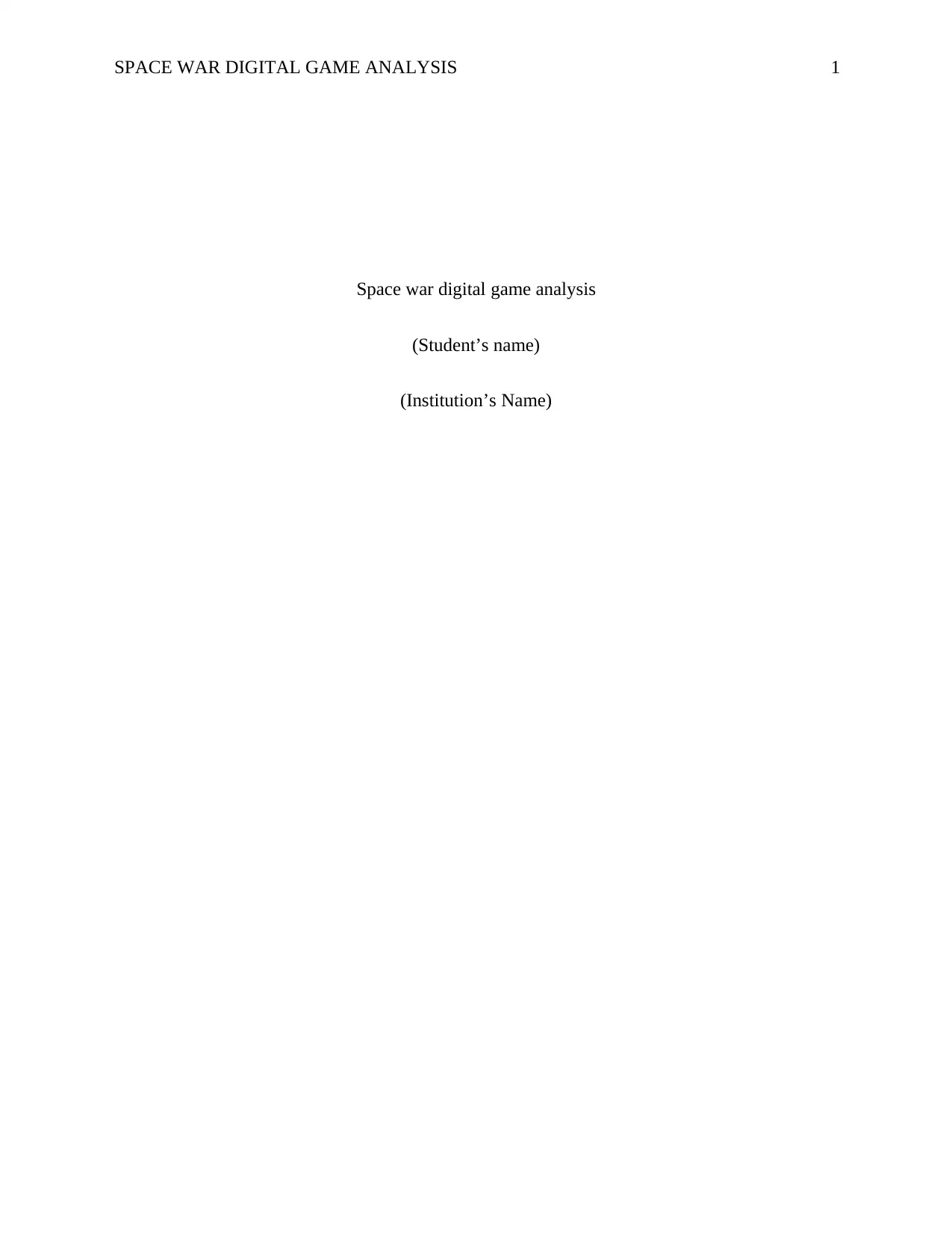
SPACE WAR DIGITAL GAME ANALYSIS 1
Space war digital game analysis
(Student’s name)
(Institution’s Name)
Space war digital game analysis
(Student’s name)
(Institution’s Name)
Paraphrase This Document
Need a fresh take? Get an instant paraphrase of this document with our AI Paraphraser
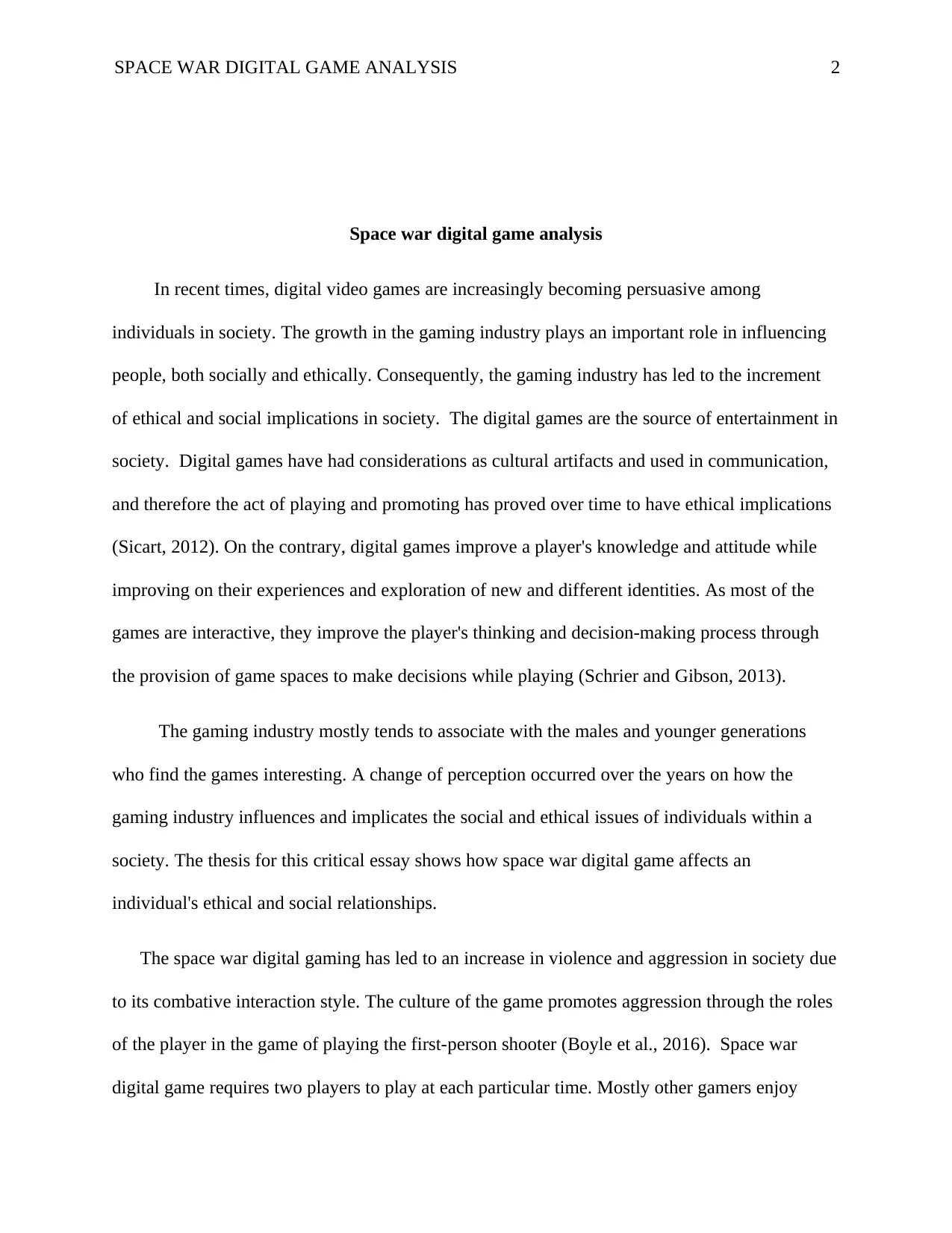
SPACE WAR DIGITAL GAME ANALYSIS 2
Space war digital game analysis
In recent times, digital video games are increasingly becoming persuasive among
individuals in society. The growth in the gaming industry plays an important role in influencing
people, both socially and ethically. Consequently, the gaming industry has led to the increment
of ethical and social implications in society. The digital games are the source of entertainment in
society. Digital games have had considerations as cultural artifacts and used in communication,
and therefore the act of playing and promoting has proved over time to have ethical implications
(Sicart, 2012). On the contrary, digital games improve a player's knowledge and attitude while
improving on their experiences and exploration of new and different identities. As most of the
games are interactive, they improve the player's thinking and decision-making process through
the provision of game spaces to make decisions while playing (Schrier and Gibson, 2013).
The gaming industry mostly tends to associate with the males and younger generations
who find the games interesting. A change of perception occurred over the years on how the
gaming industry influences and implicates the social and ethical issues of individuals within a
society. The thesis for this critical essay shows how space war digital game affects an
individual's ethical and social relationships.
The space war digital gaming has led to an increase in violence and aggression in society due
to its combative interaction style. The culture of the game promotes aggression through the roles
of the player in the game of playing the first-person shooter (Boyle et al., 2016). Space war
digital game requires two players to play at each particular time. Mostly other gamers enjoy
Space war digital game analysis
In recent times, digital video games are increasingly becoming persuasive among
individuals in society. The growth in the gaming industry plays an important role in influencing
people, both socially and ethically. Consequently, the gaming industry has led to the increment
of ethical and social implications in society. The digital games are the source of entertainment in
society. Digital games have had considerations as cultural artifacts and used in communication,
and therefore the act of playing and promoting has proved over time to have ethical implications
(Sicart, 2012). On the contrary, digital games improve a player's knowledge and attitude while
improving on their experiences and exploration of new and different identities. As most of the
games are interactive, they improve the player's thinking and decision-making process through
the provision of game spaces to make decisions while playing (Schrier and Gibson, 2013).
The gaming industry mostly tends to associate with the males and younger generations
who find the games interesting. A change of perception occurred over the years on how the
gaming industry influences and implicates the social and ethical issues of individuals within a
society. The thesis for this critical essay shows how space war digital game affects an
individual's ethical and social relationships.
The space war digital gaming has led to an increase in violence and aggression in society due
to its combative interaction style. The culture of the game promotes aggression through the roles
of the player in the game of playing the first-person shooter (Boyle et al., 2016). Space war
digital game requires two players to play at each particular time. Mostly other gamers enjoy
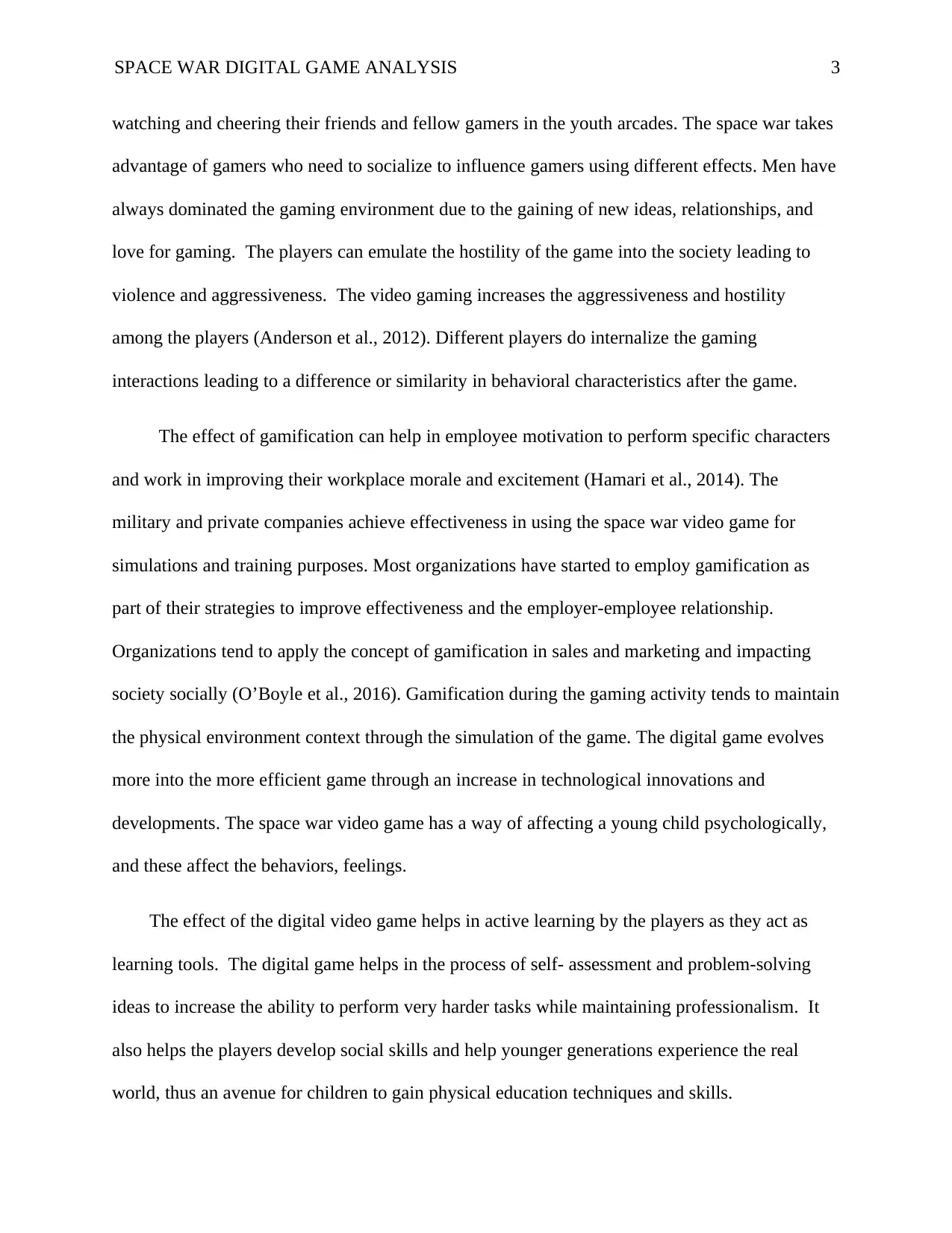
SPACE WAR DIGITAL GAME ANALYSIS 3
watching and cheering their friends and fellow gamers in the youth arcades. The space war takes
advantage of gamers who need to socialize to influence gamers using different effects. Men have
always dominated the gaming environment due to the gaining of new ideas, relationships, and
love for gaming. The players can emulate the hostility of the game into the society leading to
violence and aggressiveness. The video gaming increases the aggressiveness and hostility
among the players (Anderson et al., 2012). Different players do internalize the gaming
interactions leading to a difference or similarity in behavioral characteristics after the game.
The effect of gamification can help in employee motivation to perform specific characters
and work in improving their workplace morale and excitement (Hamari et al., 2014). The
military and private companies achieve effectiveness in using the space war video game for
simulations and training purposes. Most organizations have started to employ gamification as
part of their strategies to improve effectiveness and the employer-employee relationship.
Organizations tend to apply the concept of gamification in sales and marketing and impacting
society socially (O’Boyle et al., 2016). Gamification during the gaming activity tends to maintain
the physical environment context through the simulation of the game. The digital game evolves
more into the more efficient game through an increase in technological innovations and
developments. The space war video game has a way of affecting a young child psychologically,
and these affect the behaviors, feelings.
The effect of the digital video game helps in active learning by the players as they act as
learning tools. The digital game helps in the process of self- assessment and problem-solving
ideas to increase the ability to perform very harder tasks while maintaining professionalism. It
also helps the players develop social skills and help younger generations experience the real
world, thus an avenue for children to gain physical education techniques and skills.
watching and cheering their friends and fellow gamers in the youth arcades. The space war takes
advantage of gamers who need to socialize to influence gamers using different effects. Men have
always dominated the gaming environment due to the gaining of new ideas, relationships, and
love for gaming. The players can emulate the hostility of the game into the society leading to
violence and aggressiveness. The video gaming increases the aggressiveness and hostility
among the players (Anderson et al., 2012). Different players do internalize the gaming
interactions leading to a difference or similarity in behavioral characteristics after the game.
The effect of gamification can help in employee motivation to perform specific characters
and work in improving their workplace morale and excitement (Hamari et al., 2014). The
military and private companies achieve effectiveness in using the space war video game for
simulations and training purposes. Most organizations have started to employ gamification as
part of their strategies to improve effectiveness and the employer-employee relationship.
Organizations tend to apply the concept of gamification in sales and marketing and impacting
society socially (O’Boyle et al., 2016). Gamification during the gaming activity tends to maintain
the physical environment context through the simulation of the game. The digital game evolves
more into the more efficient game through an increase in technological innovations and
developments. The space war video game has a way of affecting a young child psychologically,
and these affect the behaviors, feelings.
The effect of the digital video game helps in active learning by the players as they act as
learning tools. The digital game helps in the process of self- assessment and problem-solving
ideas to increase the ability to perform very harder tasks while maintaining professionalism. It
also helps the players develop social skills and help younger generations experience the real
world, thus an avenue for children to gain physical education techniques and skills.
⊘ This is a preview!⊘
Do you want full access?
Subscribe today to unlock all pages.

Trusted by 1+ million students worldwide
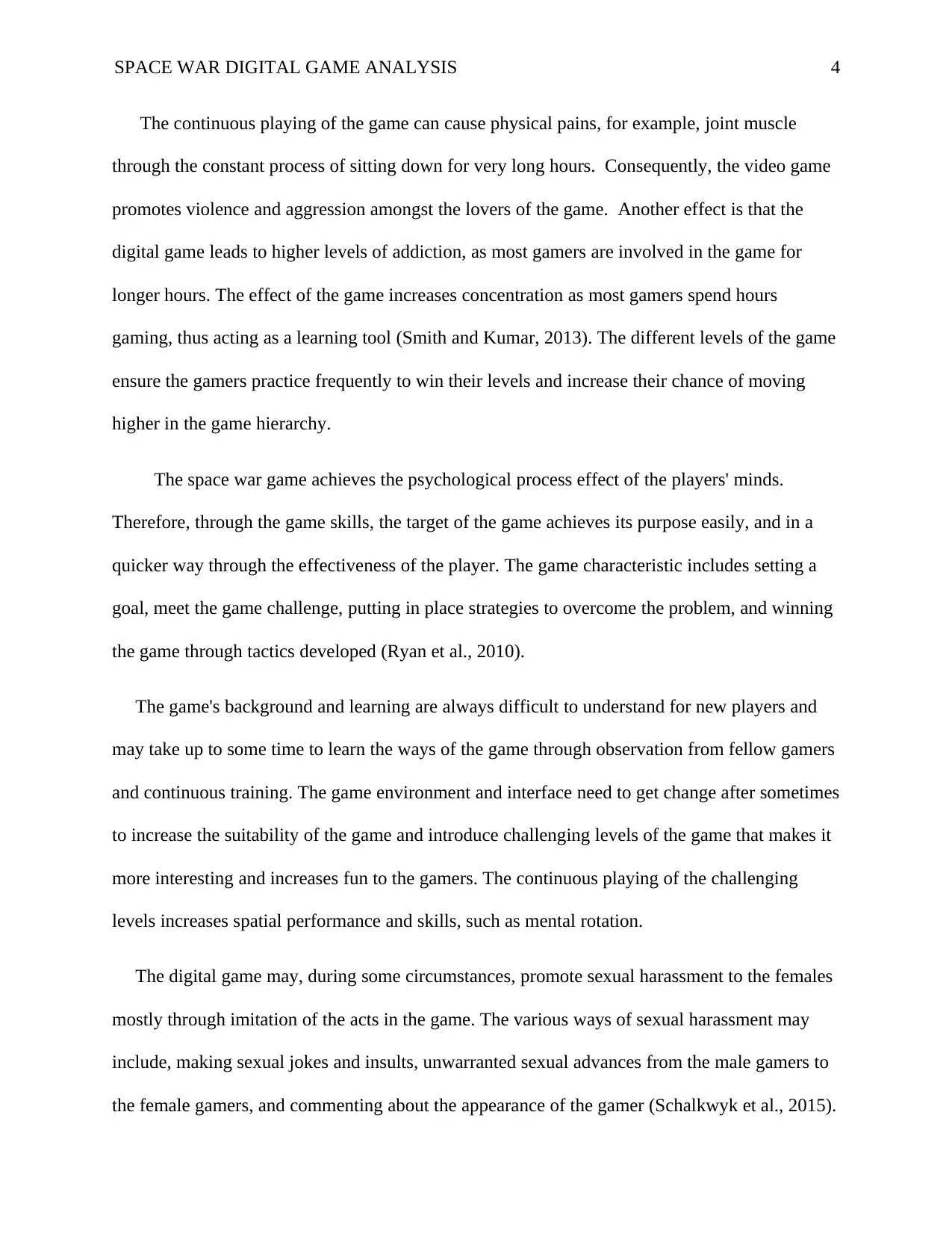
SPACE WAR DIGITAL GAME ANALYSIS 4
The continuous playing of the game can cause physical pains, for example, joint muscle
through the constant process of sitting down for very long hours. Consequently, the video game
promotes violence and aggression amongst the lovers of the game. Another effect is that the
digital game leads to higher levels of addiction, as most gamers are involved in the game for
longer hours. The effect of the game increases concentration as most gamers spend hours
gaming, thus acting as a learning tool (Smith and Kumar, 2013). The different levels of the game
ensure the gamers practice frequently to win their levels and increase their chance of moving
higher in the game hierarchy.
The space war game achieves the psychological process effect of the players' minds.
Therefore, through the game skills, the target of the game achieves its purpose easily, and in a
quicker way through the effectiveness of the player. The game characteristic includes setting a
goal, meet the game challenge, putting in place strategies to overcome the problem, and winning
the game through tactics developed (Ryan et al., 2010).
The game's background and learning are always difficult to understand for new players and
may take up to some time to learn the ways of the game through observation from fellow gamers
and continuous training. The game environment and interface need to get change after sometimes
to increase the suitability of the game and introduce challenging levels of the game that makes it
more interesting and increases fun to the gamers. The continuous playing of the challenging
levels increases spatial performance and skills, such as mental rotation.
The digital game may, during some circumstances, promote sexual harassment to the females
mostly through imitation of the acts in the game. The various ways of sexual harassment may
include, making sexual jokes and insults, unwarranted sexual advances from the male gamers to
the female gamers, and commenting about the appearance of the gamer (Schalkwyk et al., 2015).
The continuous playing of the game can cause physical pains, for example, joint muscle
through the constant process of sitting down for very long hours. Consequently, the video game
promotes violence and aggression amongst the lovers of the game. Another effect is that the
digital game leads to higher levels of addiction, as most gamers are involved in the game for
longer hours. The effect of the game increases concentration as most gamers spend hours
gaming, thus acting as a learning tool (Smith and Kumar, 2013). The different levels of the game
ensure the gamers practice frequently to win their levels and increase their chance of moving
higher in the game hierarchy.
The space war game achieves the psychological process effect of the players' minds.
Therefore, through the game skills, the target of the game achieves its purpose easily, and in a
quicker way through the effectiveness of the player. The game characteristic includes setting a
goal, meet the game challenge, putting in place strategies to overcome the problem, and winning
the game through tactics developed (Ryan et al., 2010).
The game's background and learning are always difficult to understand for new players and
may take up to some time to learn the ways of the game through observation from fellow gamers
and continuous training. The game environment and interface need to get change after sometimes
to increase the suitability of the game and introduce challenging levels of the game that makes it
more interesting and increases fun to the gamers. The continuous playing of the challenging
levels increases spatial performance and skills, such as mental rotation.
The digital game may, during some circumstances, promote sexual harassment to the females
mostly through imitation of the acts in the game. The various ways of sexual harassment may
include, making sexual jokes and insults, unwarranted sexual advances from the male gamers to
the female gamers, and commenting about the appearance of the gamer (Schalkwyk et al., 2015).
Paraphrase This Document
Need a fresh take? Get an instant paraphrase of this document with our AI Paraphraser
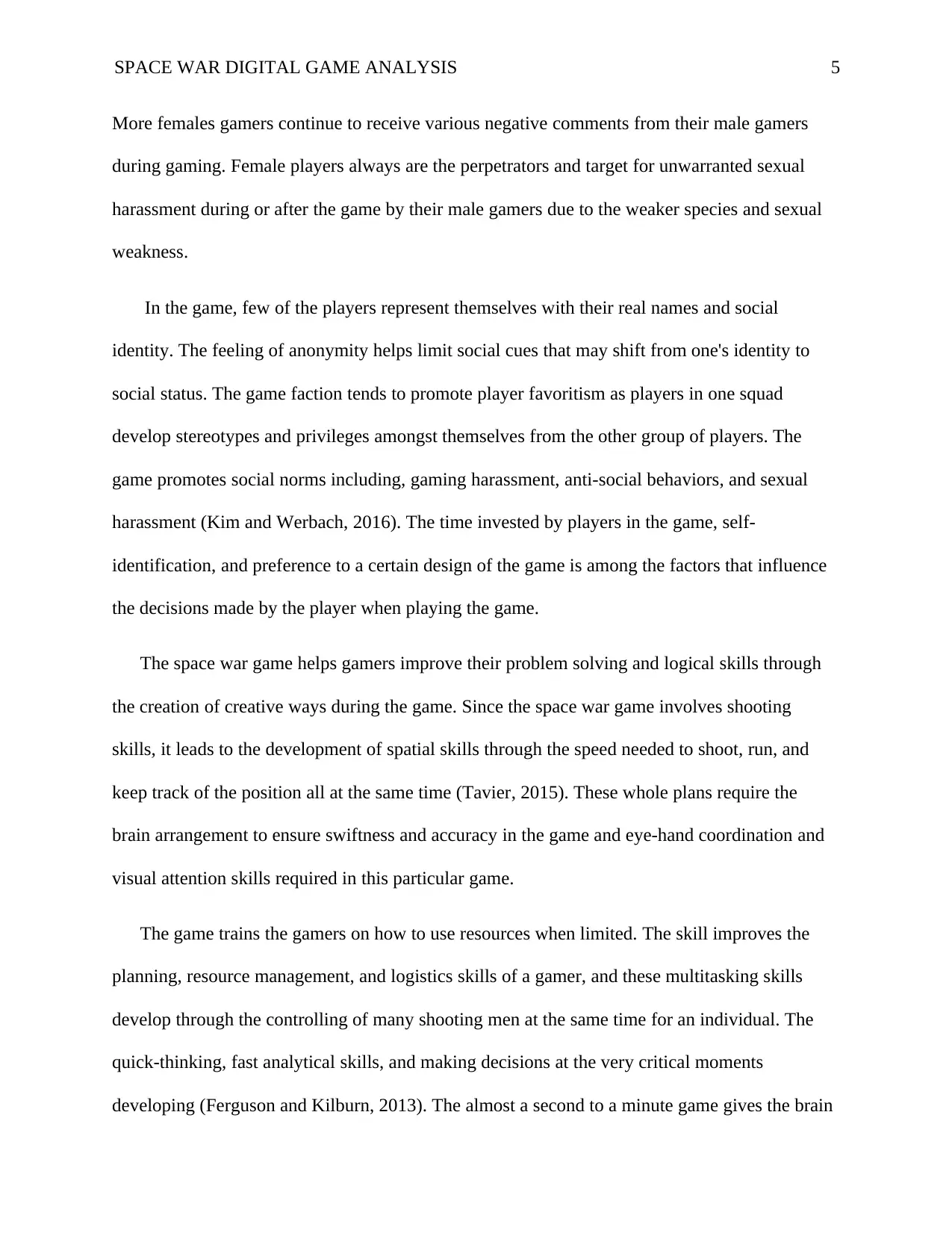
SPACE WAR DIGITAL GAME ANALYSIS 5
More females gamers continue to receive various negative comments from their male gamers
during gaming. Female players always are the perpetrators and target for unwarranted sexual
harassment during or after the game by their male gamers due to the weaker species and sexual
weakness.
In the game, few of the players represent themselves with their real names and social
identity. The feeling of anonymity helps limit social cues that may shift from one's identity to
social status. The game faction tends to promote player favoritism as players in one squad
develop stereotypes and privileges amongst themselves from the other group of players. The
game promotes social norms including, gaming harassment, anti-social behaviors, and sexual
harassment (Kim and Werbach, 2016). The time invested by players in the game, self-
identification, and preference to a certain design of the game is among the factors that influence
the decisions made by the player when playing the game.
The space war game helps gamers improve their problem solving and logical skills through
the creation of creative ways during the game. Since the space war game involves shooting
skills, it leads to the development of spatial skills through the speed needed to shoot, run, and
keep track of the position all at the same time (Tavier, 2015). These whole plans require the
brain arrangement to ensure swiftness and accuracy in the game and eye-hand coordination and
visual attention skills required in this particular game.
The game trains the gamers on how to use resources when limited. The skill improves the
planning, resource management, and logistics skills of a gamer, and these multitasking skills
develop through the controlling of many shooting men at the same time for an individual. The
quick-thinking, fast analytical skills, and making decisions at the very critical moments
developing (Ferguson and Kilburn, 2013). The almost a second to a minute game gives the brain
More females gamers continue to receive various negative comments from their male gamers
during gaming. Female players always are the perpetrators and target for unwarranted sexual
harassment during or after the game by their male gamers due to the weaker species and sexual
weakness.
In the game, few of the players represent themselves with their real names and social
identity. The feeling of anonymity helps limit social cues that may shift from one's identity to
social status. The game faction tends to promote player favoritism as players in one squad
develop stereotypes and privileges amongst themselves from the other group of players. The
game promotes social norms including, gaming harassment, anti-social behaviors, and sexual
harassment (Kim and Werbach, 2016). The time invested by players in the game, self-
identification, and preference to a certain design of the game is among the factors that influence
the decisions made by the player when playing the game.
The space war game helps gamers improve their problem solving and logical skills through
the creation of creative ways during the game. Since the space war game involves shooting
skills, it leads to the development of spatial skills through the speed needed to shoot, run, and
keep track of the position all at the same time (Tavier, 2015). These whole plans require the
brain arrangement to ensure swiftness and accuracy in the game and eye-hand coordination and
visual attention skills required in this particular game.
The game trains the gamers on how to use resources when limited. The skill improves the
planning, resource management, and logistics skills of a gamer, and these multitasking skills
develop through the controlling of many shooting men at the same time for an individual. The
quick-thinking, fast analytical skills, and making decisions at the very critical moments
developing (Ferguson and Kilburn, 2013). The almost a second to a minute game gives the brain
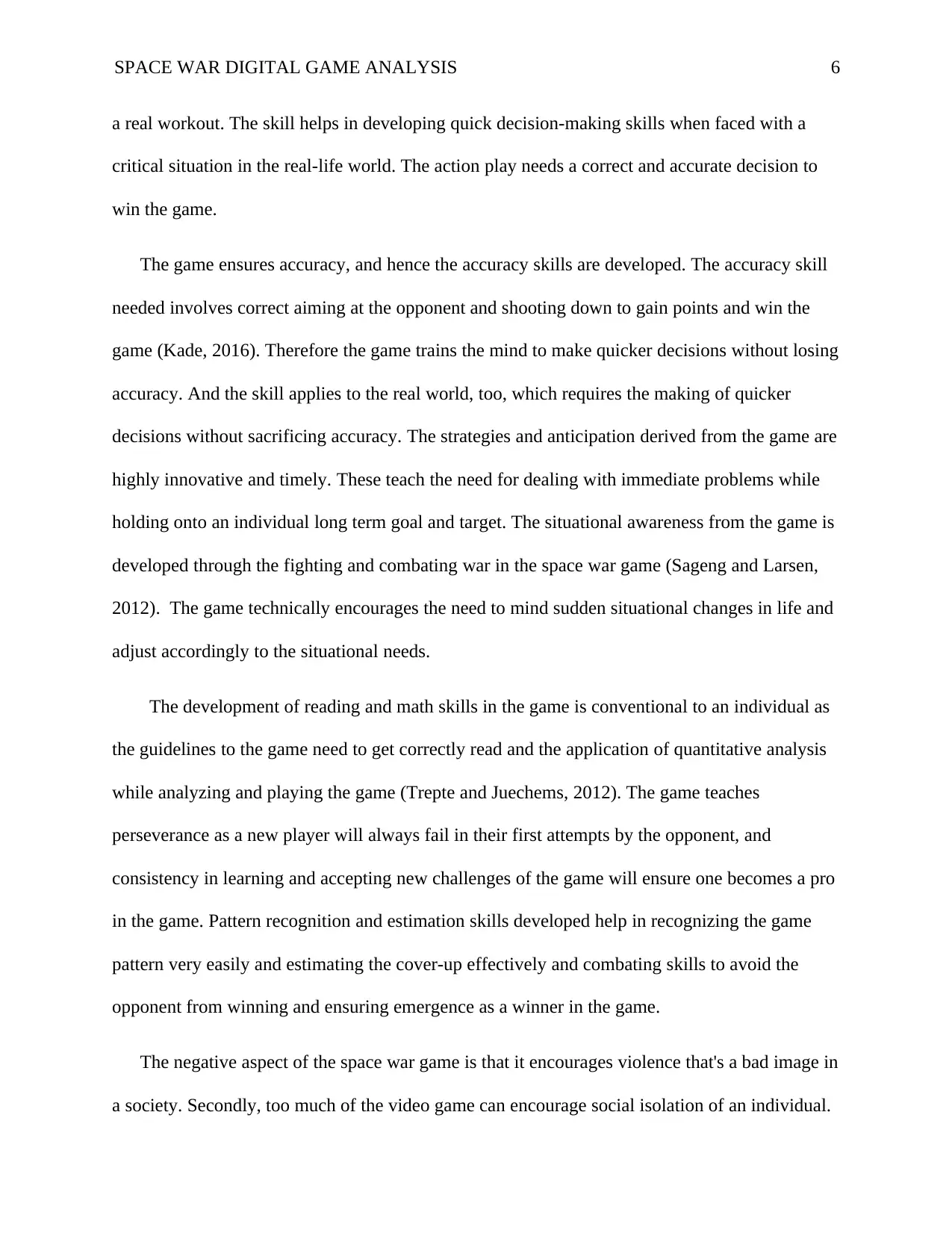
SPACE WAR DIGITAL GAME ANALYSIS 6
a real workout. The skill helps in developing quick decision-making skills when faced with a
critical situation in the real-life world. The action play needs a correct and accurate decision to
win the game.
The game ensures accuracy, and hence the accuracy skills are developed. The accuracy skill
needed involves correct aiming at the opponent and shooting down to gain points and win the
game (Kade, 2016). Therefore the game trains the mind to make quicker decisions without losing
accuracy. And the skill applies to the real world, too, which requires the making of quicker
decisions without sacrificing accuracy. The strategies and anticipation derived from the game are
highly innovative and timely. These teach the need for dealing with immediate problems while
holding onto an individual long term goal and target. The situational awareness from the game is
developed through the fighting and combating war in the space war game (Sageng and Larsen,
2012). The game technically encourages the need to mind sudden situational changes in life and
adjust accordingly to the situational needs.
The development of reading and math skills in the game is conventional to an individual as
the guidelines to the game need to get correctly read and the application of quantitative analysis
while analyzing and playing the game (Trepte and Juechems, 2012). The game teaches
perseverance as a new player will always fail in their first attempts by the opponent, and
consistency in learning and accepting new challenges of the game will ensure one becomes a pro
in the game. Pattern recognition and estimation skills developed help in recognizing the game
pattern very easily and estimating the cover-up effectively and combating skills to avoid the
opponent from winning and ensuring emergence as a winner in the game.
The negative aspect of the space war game is that it encourages violence that's a bad image in
a society. Secondly, too much of the video game can encourage social isolation of an individual.
a real workout. The skill helps in developing quick decision-making skills when faced with a
critical situation in the real-life world. The action play needs a correct and accurate decision to
win the game.
The game ensures accuracy, and hence the accuracy skills are developed. The accuracy skill
needed involves correct aiming at the opponent and shooting down to gain points and win the
game (Kade, 2016). Therefore the game trains the mind to make quicker decisions without losing
accuracy. And the skill applies to the real world, too, which requires the making of quicker
decisions without sacrificing accuracy. The strategies and anticipation derived from the game are
highly innovative and timely. These teach the need for dealing with immediate problems while
holding onto an individual long term goal and target. The situational awareness from the game is
developed through the fighting and combating war in the space war game (Sageng and Larsen,
2012). The game technically encourages the need to mind sudden situational changes in life and
adjust accordingly to the situational needs.
The development of reading and math skills in the game is conventional to an individual as
the guidelines to the game need to get correctly read and the application of quantitative analysis
while analyzing and playing the game (Trepte and Juechems, 2012). The game teaches
perseverance as a new player will always fail in their first attempts by the opponent, and
consistency in learning and accepting new challenges of the game will ensure one becomes a pro
in the game. Pattern recognition and estimation skills developed help in recognizing the game
pattern very easily and estimating the cover-up effectively and combating skills to avoid the
opponent from winning and ensuring emergence as a winner in the game.
The negative aspect of the space war game is that it encourages violence that's a bad image in
a society. Secondly, too much of the video game can encourage social isolation of an individual.
⊘ This is a preview!⊘
Do you want full access?
Subscribe today to unlock all pages.

Trusted by 1+ million students worldwide
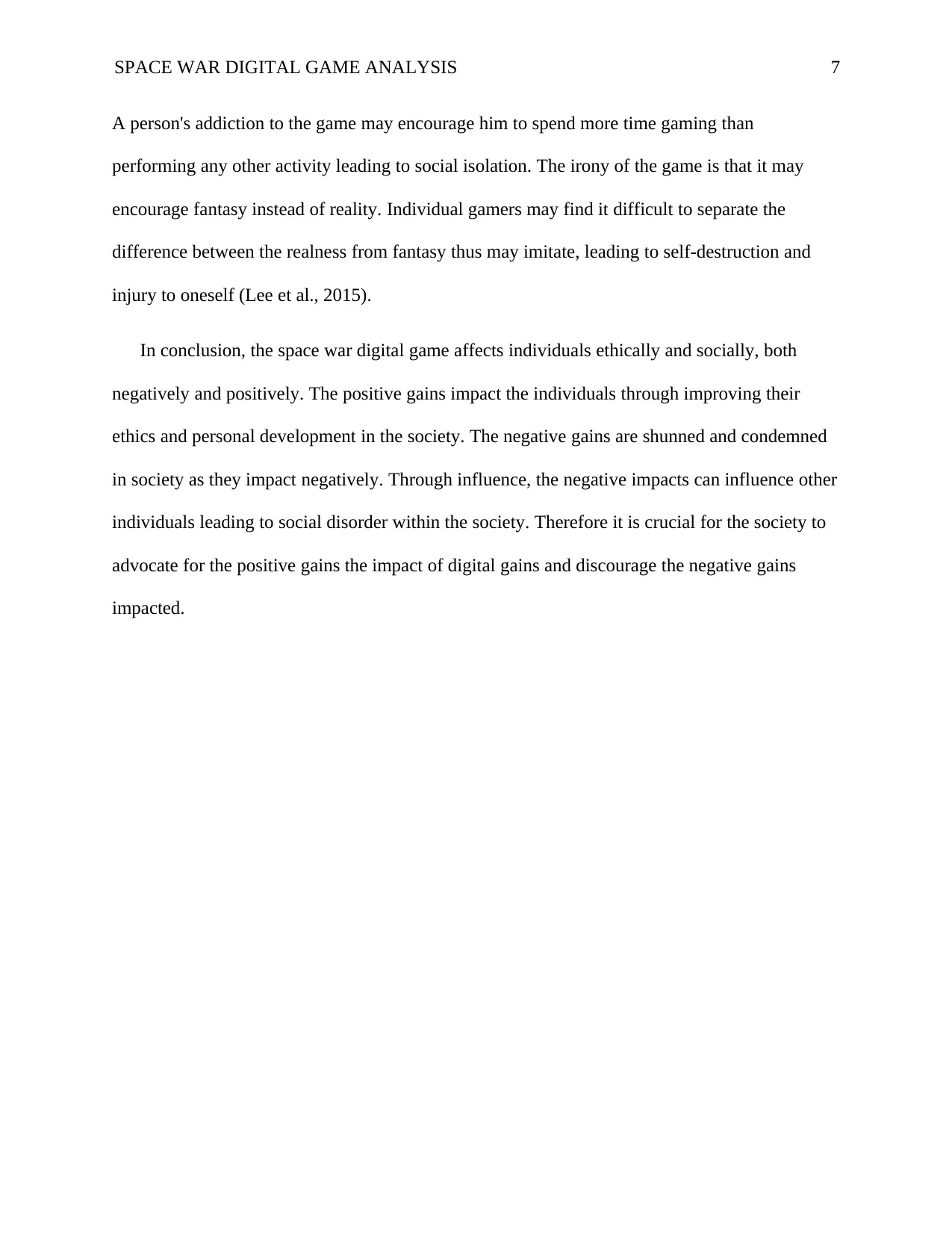
SPACE WAR DIGITAL GAME ANALYSIS 7
A person's addiction to the game may encourage him to spend more time gaming than
performing any other activity leading to social isolation. The irony of the game is that it may
encourage fantasy instead of reality. Individual gamers may find it difficult to separate the
difference between the realness from fantasy thus may imitate, leading to self-destruction and
injury to oneself (Lee et al., 2015).
In conclusion, the space war digital game affects individuals ethically and socially, both
negatively and positively. The positive gains impact the individuals through improving their
ethics and personal development in the society. The negative gains are shunned and condemned
in society as they impact negatively. Through influence, the negative impacts can influence other
individuals leading to social disorder within the society. Therefore it is crucial for the society to
advocate for the positive gains the impact of digital gains and discourage the negative gains
impacted.
A person's addiction to the game may encourage him to spend more time gaming than
performing any other activity leading to social isolation. The irony of the game is that it may
encourage fantasy instead of reality. Individual gamers may find it difficult to separate the
difference between the realness from fantasy thus may imitate, leading to self-destruction and
injury to oneself (Lee et al., 2015).
In conclusion, the space war digital game affects individuals ethically and socially, both
negatively and positively. The positive gains impact the individuals through improving their
ethics and personal development in the society. The negative gains are shunned and condemned
in society as they impact negatively. Through influence, the negative impacts can influence other
individuals leading to social disorder within the society. Therefore it is crucial for the society to
advocate for the positive gains the impact of digital gains and discourage the negative gains
impacted.
Paraphrase This Document
Need a fresh take? Get an instant paraphrase of this document with our AI Paraphraser
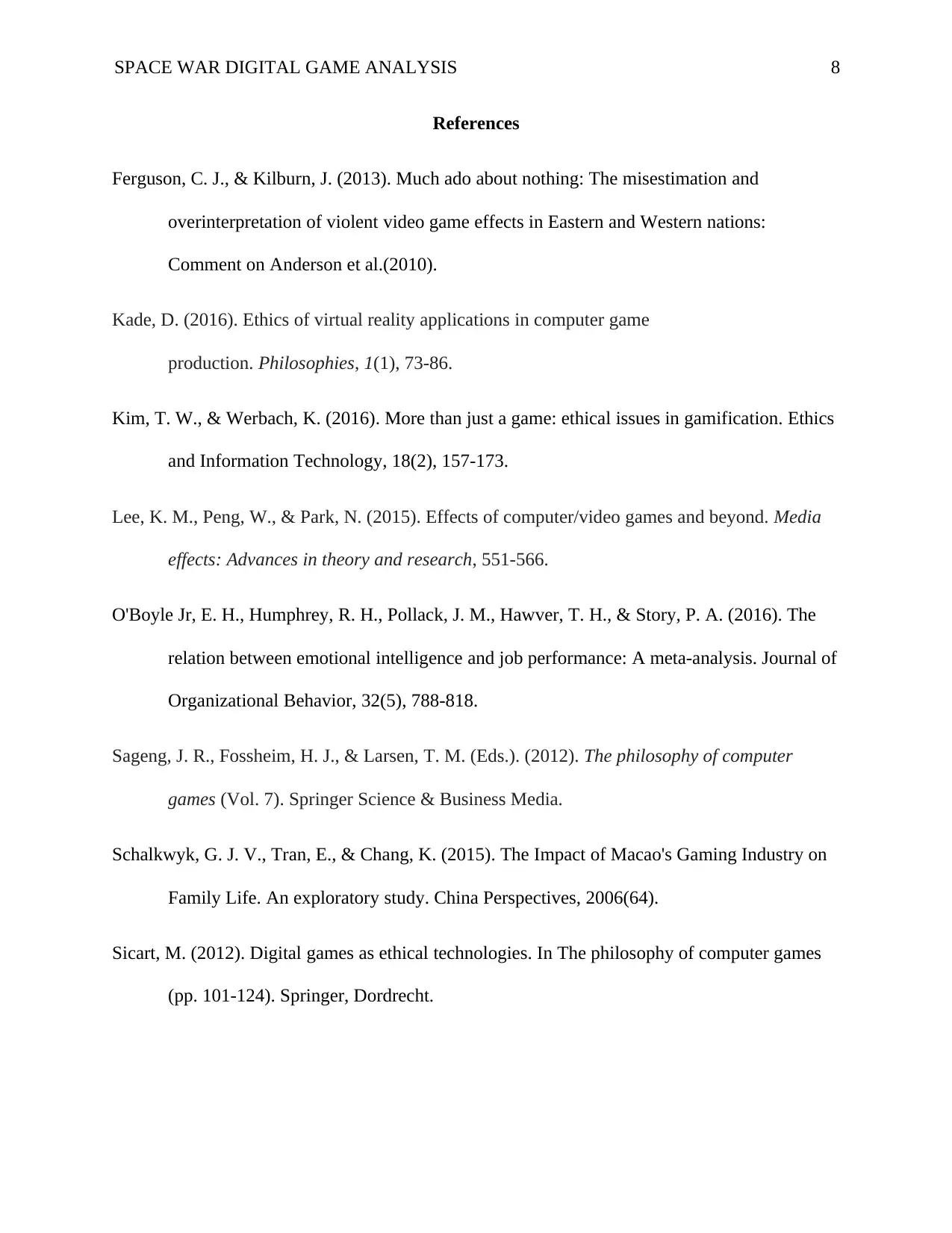
SPACE WAR DIGITAL GAME ANALYSIS 8
References
Ferguson, C. J., & Kilburn, J. (2013). Much ado about nothing: The misestimation and
overinterpretation of violent video game effects in Eastern and Western nations:
Comment on Anderson et al.(2010).
Kade, D. (2016). Ethics of virtual reality applications in computer game
production. Philosophies, 1(1), 73-86.
Kim, T. W., & Werbach, K. (2016). More than just a game: ethical issues in gamification. Ethics
and Information Technology, 18(2), 157-173.
Lee, K. M., Peng, W., & Park, N. (2015). Effects of computer/video games and beyond. Media
effects: Advances in theory and research, 551-566.
O'Boyle Jr, E. H., Humphrey, R. H., Pollack, J. M., Hawver, T. H., & Story, P. A. (2016). The
relation between emotional intelligence and job performance: A meta‐analysis. Journal of
Organizational Behavior, 32(5), 788-818.
Sageng, J. R., Fossheim, H. J., & Larsen, T. M. (Eds.). (2012). The philosophy of computer
games (Vol. 7). Springer Science & Business Media.
Schalkwyk, G. J. V., Tran, E., & Chang, K. (2015). The Impact of Macao's Gaming Industry on
Family Life. An exploratory study. China Perspectives, 2006(64).
Sicart, M. (2012). Digital games as ethical technologies. In The philosophy of computer games
(pp. 101-124). Springer, Dordrecht.
References
Ferguson, C. J., & Kilburn, J. (2013). Much ado about nothing: The misestimation and
overinterpretation of violent video game effects in Eastern and Western nations:
Comment on Anderson et al.(2010).
Kade, D. (2016). Ethics of virtual reality applications in computer game
production. Philosophies, 1(1), 73-86.
Kim, T. W., & Werbach, K. (2016). More than just a game: ethical issues in gamification. Ethics
and Information Technology, 18(2), 157-173.
Lee, K. M., Peng, W., & Park, N. (2015). Effects of computer/video games and beyond. Media
effects: Advances in theory and research, 551-566.
O'Boyle Jr, E. H., Humphrey, R. H., Pollack, J. M., Hawver, T. H., & Story, P. A. (2016). The
relation between emotional intelligence and job performance: A meta‐analysis. Journal of
Organizational Behavior, 32(5), 788-818.
Sageng, J. R., Fossheim, H. J., & Larsen, T. M. (Eds.). (2012). The philosophy of computer
games (Vol. 7). Springer Science & Business Media.
Schalkwyk, G. J. V., Tran, E., & Chang, K. (2015). The Impact of Macao's Gaming Industry on
Family Life. An exploratory study. China Perspectives, 2006(64).
Sicart, M. (2012). Digital games as ethical technologies. In The philosophy of computer games
(pp. 101-124). Springer, Dordrecht.
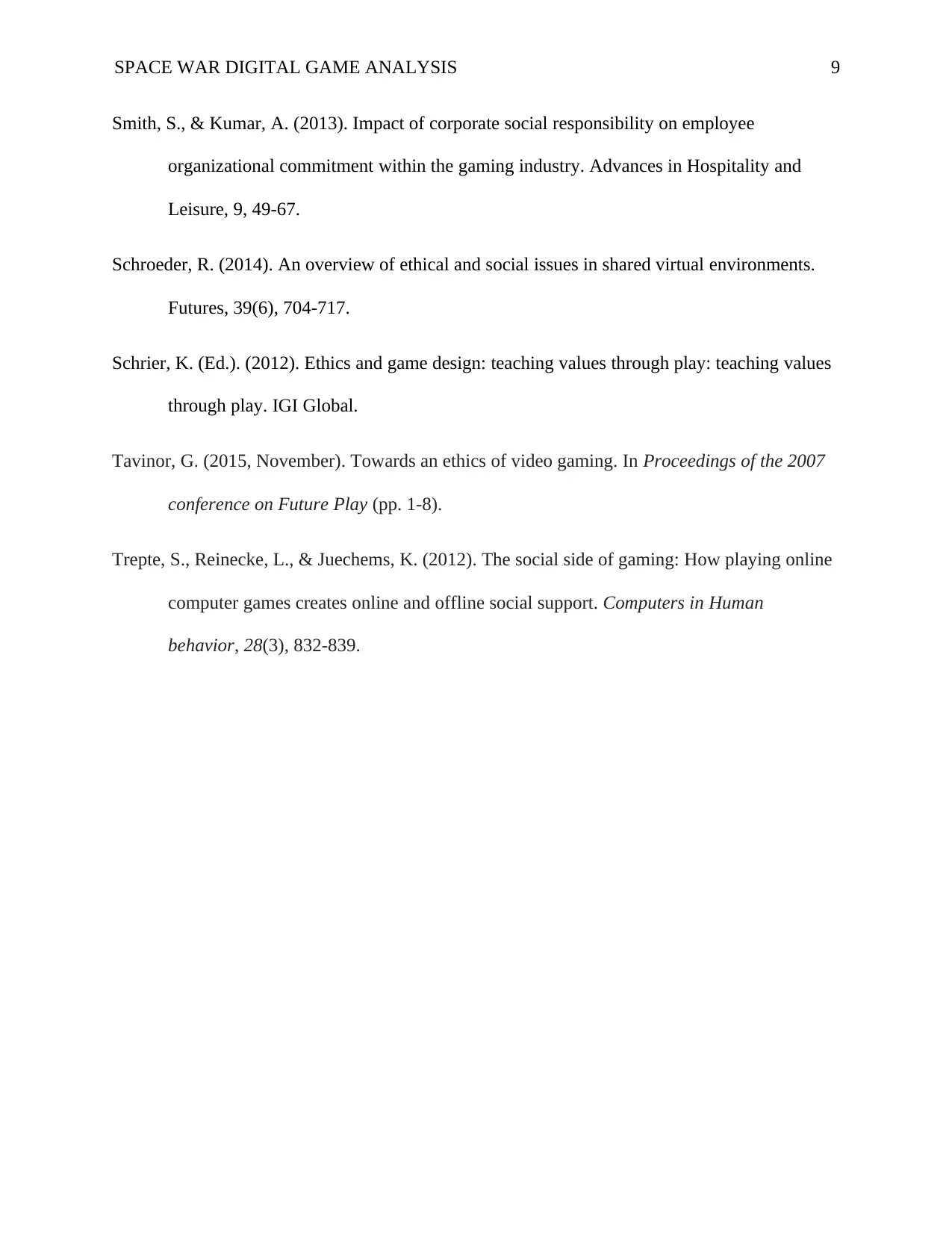
SPACE WAR DIGITAL GAME ANALYSIS 9
Smith, S., & Kumar, A. (2013). Impact of corporate social responsibility on employee
organizational commitment within the gaming industry. Advances in Hospitality and
Leisure, 9, 49-67.
Schroeder, R. (2014). An overview of ethical and social issues in shared virtual environments.
Futures, 39(6), 704-717.
Schrier, K. (Ed.). (2012). Ethics and game design: teaching values through play: teaching values
through play. IGI Global.
Tavinor, G. (2015, November). Towards an ethics of video gaming. In Proceedings of the 2007
conference on Future Play (pp. 1-8).
Trepte, S., Reinecke, L., & Juechems, K. (2012). The social side of gaming: How playing online
computer games creates online and offline social support. Computers in Human
behavior, 28(3), 832-839.
Smith, S., & Kumar, A. (2013). Impact of corporate social responsibility on employee
organizational commitment within the gaming industry. Advances in Hospitality and
Leisure, 9, 49-67.
Schroeder, R. (2014). An overview of ethical and social issues in shared virtual environments.
Futures, 39(6), 704-717.
Schrier, K. (Ed.). (2012). Ethics and game design: teaching values through play: teaching values
through play. IGI Global.
Tavinor, G. (2015, November). Towards an ethics of video gaming. In Proceedings of the 2007
conference on Future Play (pp. 1-8).
Trepte, S., Reinecke, L., & Juechems, K. (2012). The social side of gaming: How playing online
computer games creates online and offline social support. Computers in Human
behavior, 28(3), 832-839.
⊘ This is a preview!⊘
Do you want full access?
Subscribe today to unlock all pages.

Trusted by 1+ million students worldwide
1 out of 9
Related Documents
Your All-in-One AI-Powered Toolkit for Academic Success.
+13062052269
info@desklib.com
Available 24*7 on WhatsApp / Email
![[object Object]](/_next/static/media/star-bottom.7253800d.svg)
Unlock your academic potential
Copyright © 2020–2025 A2Z Services. All Rights Reserved. Developed and managed by ZUCOL.





